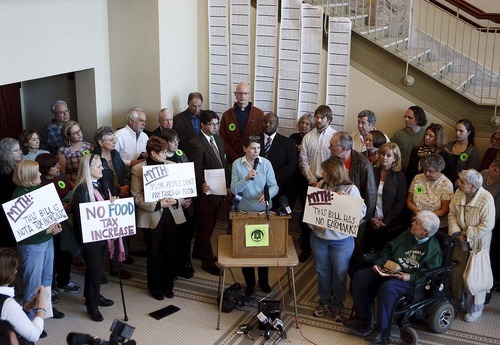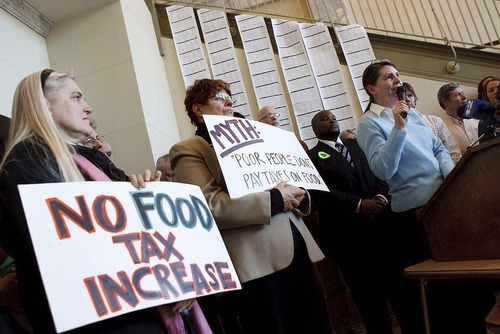This is an archived article that was published on sltrib.com in 2011, and information in the article may be outdated. It is provided only for personal research purposes and may not be reprinted.
Opponents of doubling the sales tax on food won a surprising victory Wednesday, persuading a committee to kill — by one vote — the House version of the proposal. But more battles loom.
The House Revenue and Taxation Committee voted 7-6 to hold, or kill for now, HB282 by Rep. Kay McIff, R-Richfield.
It came a day after House Speaker Becky Lockhart, R-Provo, announced she opposes raising sales taxes on food, but said her Republican caucus has not yet taken a stand. It also came a day after a Capitol rally against the tax hike and after news media editorials against it.
"We're shocked. We didn't expect this," said Linda Hilton, director of the Coalition of Religious Communities, which has helped lead opposition.
She said she doesn't know if that is a sign the House also will kill a Senate-passed bill , SB270, to raise sales tax on food, or if the vote shows support instead for the Senate bill.
"We're counting votes, and it's close," Hilton said. "So we don't know."
McIff also said he is unsure what defeat of his bill portends for the Senate version. "I'm not sure where that's headed in the House," he said. "It's never had the support in the House that it has in the Senate — for years."
Two and a half years ago, the Legislature — under pressure from then-Gov. Jon Huntsman Jr. — lowered the sales tax on food from 4.7 to 1.75 percent. McIff's proposal would have set the state sales tax on all items to 4.39 percent, essentially doubling the tax on food but dropping the rate slightly on everything else.
The Senate version would do nearly the same, but set the new sales tax rate at 4.35 percent.
McIff's bill had two other key differences. First, it would have created an earned-income tax credit to help the poor afford the higher sales tax on food — which would cut into revenue.
Second, it would have forced some sales taxes — such as those charged by the Utah Transit Authority — to be lowered slightly. They were raised two years ago so that the UTA would not lose overall revenue from lowering the taxes on food, so McIff's bill would have reset them as food taxes were restored.
McIff argued adding more taxes on food would stabilize volatile state revenues during tough economic times, because everyone eats. But advocates for the poor argued it would hurt the poor more because they spend a higher percentage of their income on necessary food.
"It may not seem like this tax amounts to much, but when you're just making ends meet, every dollar counts," testified Mike Evans, of Utahns Against Hunger. "This tax increase could be the difference between a family having to skip a meal and the same family enjoying a meal around a table together."
Art Sutherland, testifying for the Coalition of Religious Communities, said the bill would "leave a lot of poor people and middle-income people paying a lot higher taxes."
The full House still may consider SB270, which passed the Senate on a 19-9 vote Monday.
Senate President Michael Waddoups, R-Taylorsville, opposed SB270, but it passed that chamber with all but three Republicans voting for it. Every Democratic senator present voted against the bill.





